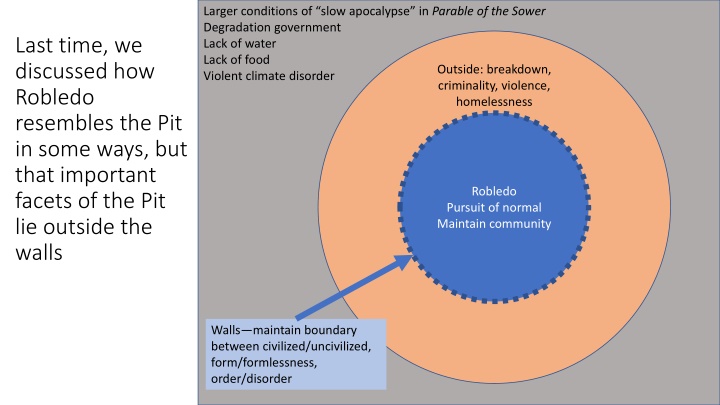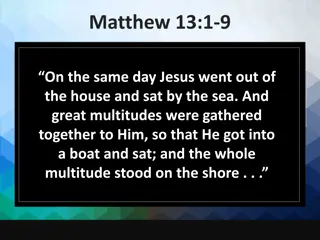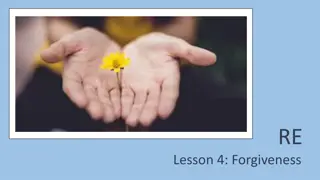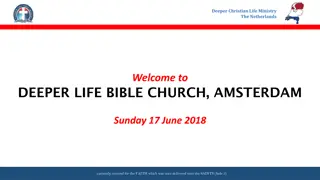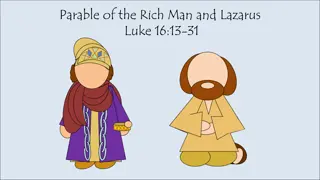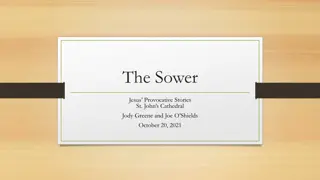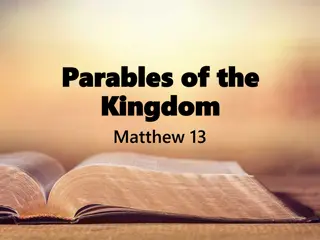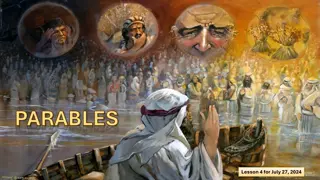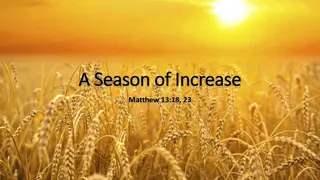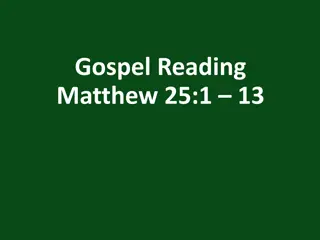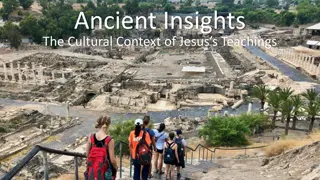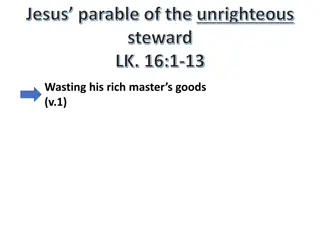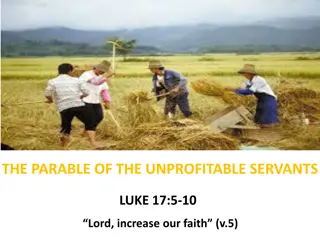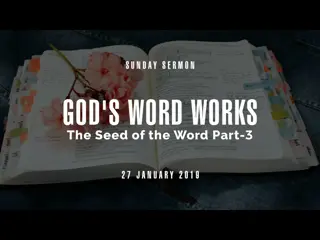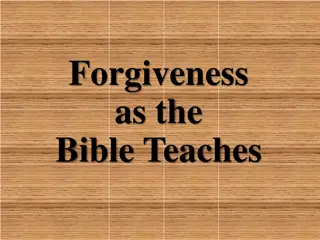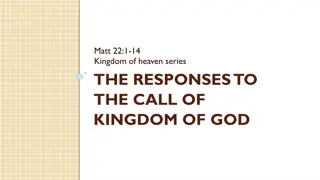Larger Conditions of Slow Apocalypse in Parable of the Sower
In "Parable of the Sower," the slow apocalypse unfolds through degradation of government, lack of resources, and violent climate disorder. Robledo's struggle to maintain order and purity within the walls symbolizes a battle against the external chaos. Themes of salvage, purity, and danger intersect as characters navigate between civilization and formlessness. Explore the hidden facets of the slow apocalypse and disruptions in societal order through key events like Dad's disappearance and the fire at the Payne-Parrish house.
Download Presentation

Please find below an Image/Link to download the presentation.
The content on the website is provided AS IS for your information and personal use only. It may not be sold, licensed, or shared on other websites without obtaining consent from the author.If you encounter any issues during the download, it is possible that the publisher has removed the file from their server.
You are allowed to download the files provided on this website for personal or commercial use, subject to the condition that they are used lawfully. All files are the property of their respective owners.
The content on the website is provided AS IS for your information and personal use only. It may not be sold, licensed, or shared on other websites without obtaining consent from the author.
E N D
Presentation Transcript
Larger conditions of slow apocalypse in Parable of the Sower Degradation government Lack of water Lack of food Violent climate disorder Last time, we discussed how Robledo resembles the Pit in some ways, but that important facets of the Pit lie outside the walls Outside: breakdown, criminality, violence, homelessness Robledo Pursuit of normal Maintain community Walls maintain boundary between civilized/uncivilized, form/formlessness, order/disorder
Mary Douglas Purity and Danger Purity is the enemy of change, of ambiguity and compromise. Most of us indeed would feel safer if our experience could be hard- set and fixed in form (163). Douglas--things that have half-identities bits of trash still recognizable as things provoke disgust. Dirt, though = does not produce disgust. But salvage = a process of taking things that have half-identities and making them useful again. Salvage requires confronting disorder and disaster.
Salvage, then, seems to work like this Order, civilization, walls, form, baptisms, wearing of clean clothes, purity, civilization Disorder, dirt, formlessness, criminality, fire, garbage, disaster, lack of civilization. Salvage operates between these two modes
Robledo = struggle to maintain order and purity TAKING RISKS TO PERFORM BAPTISMS CONSIDERING VOTING FOR A FASCIST PRESIDENT WEARING CLEAN CLOTHES WHILE INSIDE ROBLEDO NOT LETTING KIDS GO AROUND BAREAFOOT (91) SHUNNING THE PRODUCTS OF ILLICIT SEXUAL ENCOUNTERS LABELING OTHER CHARACTERS AS CRAZY, CRIMINAL, OR OTHERWISE INHUMAN
Robledo and slow apocalypse Slow apocalypse term used by Jeff VanderMeer, others to describe a disaster that is ongoing but not immediately visible. Garbage piles up, planet warms, hurricanes increase in number, wildfires spread and yet all of this is hard to notice. They are living through a slow apocalypse, and pretending this is not the case. As a side note, walls = common trope post-apocalyptic literature; as E.g. zombie narratives, putting up barricades to keep out the dead
Keiths revelations about his activities (92, 97-99, 104-106), and death (113). How does order break down in the following events? Get into groups and discuss these Dad s disappearance (129-135) The fire set at the Payne-Parrish house (143-149)
Laurens viewpoint differs slightly from that of her father. Lauren is not interested in purity she accepts a more salvage- oriented mindset, oriented toward the wastelands outside the walls. But Earthseed, as we discussed last time, is a revolutionary or evolutionary kind of change away from the partial change that salvage entails. Lauren hopes for a new, ordered future, either on another planet or in the greener areas of the North.
Outside Robledo, we see acts of salvage Keith squatting in abandoned building Most upsetting to me, though, there were a few more rag, stick, cardboard, and palm frond shacks along the way into the hills along River Street. There always seem to be more. They've never bothered us beyond begging and cursing, but they always stare so. It gets harder to ride past them. They're living skeletons, some of them. Skin and bones and a few teeth. They eat whatever they can find up there (89).
When apparent stability disintegrates, As it must God is Change People tend to give in To fear and depression, To need and greed. When no influence is strong enough To unify people They divide. They struggle, One against one, Group against group, For survival, position, power. They remember old hates and generate new ones, They create chaos and nurture it. They kill and kill and kill, Until they are exhausted and destroyed, Until they are conquered by outside forces, Or until one of them becomes A leader Most will follow, Or a tyrant Most fear. (103) Civilization is to groups what intelligence is to individuals. It is a means of combining the intelligence of many to achieve ongoing group adaptation. Civilization, like intelligence may serve well, serve adequately, or fail to serve its adaptive function. When civilization fails to serve, it must disintegrate unless it is acted upon by unifying internal or external forces (101) How do these quotations treat the question of order?
Where, then, does Earthseed fit into this framework? Order, civilization, walls, form, baptisms, wearing of clean clothes, purity, civilization Disorder, dirt, formlessness, criminality, fire, garbage, disaster, lack of civilization. Salvage operates between these two modes
